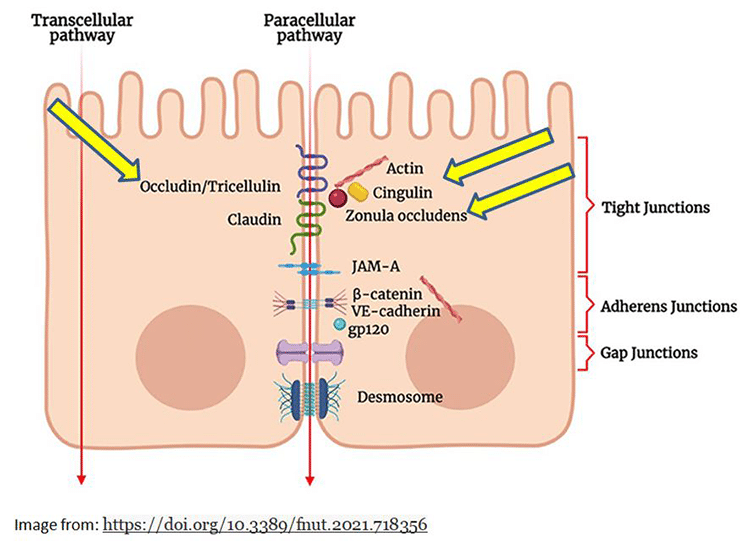The Truth About Leaky Gut Testing
Leaky gut is a lead driver of gas and bloating, systemic inflammation, neural inflammation, joint pain and autoimmunity. What is leaky gut? Leaky gut means that the intestinal lining is damaged, inflamed and permeable (or leaky). Intestinal permeability (aka Leaky Gut) allows more debris, toxins and intact particles of food to move across the intestinal lining and make their way into the bloodstream.
This triggers an immune response and a cascade of symptoms that can affect the entire body.
If present, you have a major organ that is inflamed, and this will have systemic effects on your health. I never assume that a patient has leaky gut in my practice. It is best to test for this and treat this first!
Currently, there are three ways to test for leaky gut and only one of them is reliable.
Lactulose Mannitol Urine Test for Leaky Gut:
Lactulose and mannitol are sugars that are consumed. If intestinal permeability is present, some of the lactulose will pass through into the bloodstream. This is then excreted in urine. The mannitol acts as a control. It is a much smaller molecule and some will be absorbed across the intestinal lining and excreted through the urine.
Results include total urinary lactulose, total urinary mannitol and total urinary lactulose: mannitol ratio.
Leaky gut is diagnosed if:
- Lactulose levels are elevated and/ or there is a high lactulose to mannitol ratio.
Test Cons
Although this may be an easier test to administer, being an at-home urine collection, it has huge limitations that question is accuracy and reliability of diagnosing intestinal permeability.
- There’s no standardized ‘normal’ group for comparison. Labs create the ‘normal’ group to compare your results against.
- Intestinal permeability can change across the day and days. This depends on stress, sleep, immune reaction, inflammation kicking up and what you’ve eaten.
- There’s no standardized collection time among lab kits. A recent New Zealand study showed that more accurate results are collected 2.5 to 4 hours after consuming the sugar solution (most labs collect for 6 hours – which may lead to inaccurate results).(1)
- Lactulose crossing the barrier does not necessarily indicate intestinal permeability; allowing food particles to leak across the intestinal tract. Lactulose, albeit a larger molecule than mannitol, is still relatively small. So small, that it would not be antigenic (trigger an immune reaction).
Zonulin Testing for Leaky Gut:
If you were told that you have leaky gut based on this marker, you were misled. This is not a confirmed diagnosis.
Zonulin is a protein that’s made mainly in the liver, but also found in various organs, including the intestinal tract. Zonulin can be tested through stool, blood (serum) and through antibody testing.
Why Zonulin is not an Accurate Marker to Diagnose Leaky Gut
Serum levels of zonulin DO NOT only reflect intestinal secretion; zonulin is also secreted from other organs. In fact, some studies show that serum (blood) zonulin has been associated more with obesity, overweight and hyperlipidemia, than was GI symptoms.(2)
We really need to be wary of considering zonulin as THE sole biomarker of leaky gut. There’re more than 50 different proteins that participate in the regulation of intestinal permeability. When compared to the lactulose: mannitol urine test, serum zonulin did not correlate with this ratio (i.e. it’s not a reliable way to test for leaky gut).(3)
Stool (fecal) Zonulin for Leaky Gut:
Zonulin levels fluctuate – in stool and in blood. So measuring this directly, by itself, is not a valid way to diagnose leaky gut. Vojdani A, Vojdani E, Kharrazian D. Fluctuation of zonulin levels in blood vs stability of antibodies.(4)
Studies have also shown that elevated stool zonulin does not correlate with a positive lactulose: mannitol urine test results.(5)
The way to get around the unreliability of a fluctuating zonulin marker and lactulose: mannitol urine test, is to test various antibody markers in serum-blood to correctly diagnose leaky gut.
What is the Best Test to Diagnose Leaky Gut?
The most accurate way to test for intestinal permeability is test that measures antibodies to lipopolysaccharides (LPS), occludin, zonulin, actomyosin.
These are all larger molecules, that would better compare to the size of food proteins which are antigenic (will challenge the immune system).
This is a big deal when we compare this to the lactulose: mannitol urine test. These sugars are so small that they wouldn’t trigger an immune response. The goal with leaky gut testing is to determine if the level of leakiness will trigger an immune response. Otherwise, why run a test?
- LPS are large molecules that’re released from the membranes of gram negative bacteria, when they rapidly turn over in the intestinal tract. LPS triggers leaky gut, intestinal inflammation and systemic inflammation. LPS can even make its way into the brain, causing neural inflammation. If antibodies are present, this helps with direct targeting of treatment to bind and reduce LPS levels. This also means that leaky gut is, in part, being driven by dysbiosis; specifically a gram negative bacteria overgrowth
- Occludin is a protein that helps hold together the tight junctions between cells. When antibodies are detected, this means that these tight junctions are breaking down.
- Actomyosin is a network of protein complexes of actin and myosin, that maintain tight junctions. When antibodies are detected, this means that these tight junctions are breaking down.
- I’ve already explained what Zonulin I prefer to see zonulin AND another marker positive to confirm a leaky gut diagnosis.
Order Your Leaky Gut Test Here
- Sequeira IR, Lentle RG, Kruger MC, Hurst RD. Standardizing the lactulose mannitol test of gut permeability to minimize error and promote comparability. PLoS One. 2014 Jun 5;9(6):e99256. doi: 10.1371/journal.pone.0099256.
- Ohlsson B, Orho-Melander M, Nilsson PM. Higher Levels of Serum Zonulin May Rather Be Associated with Increased Risk of Obesity and Hyperlipidemia, Than with Gastrointestinal Symptoms or Disease Manifestations. Int J Mol Sci. 2017 Mar 8;18(3):582.
- Diabetologia. 2010;53:2621–2628. doi: 10.1007/s00125-010-1903-9.
- World J Gastroenterol. 2017 Aug 21;23(31):5669-5679. doi: 10.3748/wjg.v23.i31.5669.
- Hałasa M, Maciejewska D, Ryterska K, Baśkiewicz-Hałasa M, Safranow K, Stachowska E. Assessing the Association of Elevated Zonulin Concentration in Stool with Increased Intestinal Permeability in Active Professional Athletes. Medicina (Kaunas). 2019 Oct 21;55(10):710. doi: 10.3390/medicina55100710.




